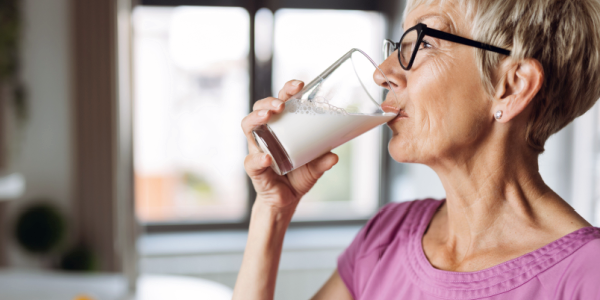
Approaching or experiencing menopause may be a stage of curiosity, worry, and anxiety about your nutritional needs—the ones that support bone health, especially.
But know it's normal to wonder, "Does menopause cause vitamin D deficiency?" Or, "How much calcium do I need during menopause?"
Rest assured, we have answers to navigate these changes with your bone health top of mind. Let's dive in!
What Is Menopause?
Menopause may sound like an unnerving time of life, and people often speak of hot flashes and hormone changes with unease. Plus, the risk of heart disease and other health conditions generally rises during this time. So, it’s natural to experience some trepidation when entering this unique phase of life.
But experiencing menopause can help you evaluate priorities. It can also encourage you to take charge of your health and look at life through a new lens. In other words, it can be an exciting and enjoyable phase of life (instead of a dreaded one).
Contrary to popular belief, menopause is not considered a disorder or disease. For women, it’s a natural part of life. Hormone changes concurrent with menstrual cycles ending are the most well-known, but other common symptoms include:
• Changes in mood
• Difficulty sleeping
• Hot flashes
• Painful sex
Although it may initially seem alarming, a certain degree of bone loss can also be expected as a menopause symptom. This is largely due to a change of estrogen levels in the body, since estrogen encourages bones to absorb calcium.
Menopause and Bone Health
During menopause, bone mass shifts and the body absorbs calcium differently. Calcium is crucial to maintaining bone health and is the main mineral responsible for bone structure. It also helps support the muscles that support bones.
Vitamin D is another nutrient needed for healthy bones. Vitamin D works with calcium to keep the bones in the body healthy and can help balance the amount of calcium in the blood.
Menopause may also influence vitamin D levels, especially if symptoms keep you indoors. This is because the availability of vitamin D in the body is impacted by the amount of sunlight your skin receives during the day. It may sound a bit like science fiction, but sunlight helps the body turn vitamin D into a form it can use.
As an added complication, stomach acid production tends to decrease with age. A change in stomach acidity can influence the amount of calcium absorbed from foods and supplements as they travel through the digestive tract.
Fortunately, understanding how to meet the recommended calcium and vitamin D level can help you avoid nutrient deficiency during menopause. Plus, nutrient-rich foods can help promote wellness beyond reproductive health.
Calcium and Vitamin D for Menopause
Since menopause causes an increased risk of calcium and vitamin D deficiency, it’s more important than ever to meet your daily nutrient requirements during this time. For women 40 to 50 years old, getting at least 1,000 milligrams (mg) of calcium a day is recommended. Women over 50 should aim for at least 1,200 mg of calcium daily.
In addition to meeting the recommended calcium intake, menopausal women should meet the daily requirement for vitamin D:
• For women ages 19 to 70, 15 micrograms (mcg) per day, or 600 International Units (IU), is the daily recommendation.
• Women 71 years and older should aim for 20 mcg (800 IU) to avoid vitamin D deficiency.
Since everyone’s body and health histories can differ, work closely with your healthcare team to decide the amount of calcium or vitamin D that is right for you. Working with a dietitian can be helpful since they can help you navigate your nutrient needs during this unique phase of life, and recommend high-quality supplements when necessary.
Calcium and Vitamin D Sources
As with other nutrients, calcium and vitamin D are available in both food and supplemental forms. Eating the following calcium-rich foods can fortify bones against deficiency:
• Dairy, including milk, yogurt, and cheese
• Seafood with soft bones, such as sardines or salmon
• Vegetables, especially dark leafy greens like bok choy, broccoli, and spinach
• Other calcium-fortified foods, including breakfast beverages, some cereals, and soy products
Vitamin D is found in a few foods naturally, making it more difficult to obtain from food. However, the following foods contain natural sources of vitamin D to enrich the diet:
• Cheese
• Egg yolks
• Fatty fish, such as salmon, tuna, and mackerel
• Mushrooms treated with ultraviolet (UV) light
• Some organ meats, particularly beef liver
Luckily, many commonly consumed foods are fortified with calcium and vitamin D to increase the likelihood of meeting daily nutrient goals. Looking closely at a nutrition label can help you decipher what percentage of your vitamin D goal is being met by that food. This practice can also help you determine if supplementation may be a good idea.
Like medications, supplements can have side effects. For this reason, dietitians generally recommend trying to meet your nutrient needs throughout food first. However, supplementing during menopause may make sense to keep your bones healthy. Meeting with your healthcare team regularly can help you to evaluate and re-evaluate your needs.
Best Calcium and Vitamin D Supplements for Menopause
If you’re having trouble meeting your daily requirements with food alone, supplements are always an option. The following tips can help you to choose the best calcium, vitamin D, or calcium-vitamin D combo supplement.
Consider Different Forms
Not taking any supplements currently? A multivitamin is a great place to start. When going through menopause, search for a multivitamin supplement for women 50 years and older. One benefit of taking a multivitamin is that calcium and vitamin D often come together, requiring fewer pills.
It’s helpful to understand that calcium supplements come in many shapes and forms when looking for specific bone health supplements. The form of calcium that is “best” often comes down to personal preference, although a few recommendations exist. The most common types of calcium found in supplements include calcium carbonate and calcium citrate, which are considered better for those with absorption issues.
In terms of vitamin D supplementation, vitamin D3 is generally recommended above other forms. The two most common forms of supplemental vitamin D are vitamin D2 and vitamin D3. However, vitamin D3 is believed to be more bioavailable (better absorbed).
Since fatty fish are a natural source of vitamin D, supplementing with fish liver oils is also an option. Cod liver oil is a top choice among many, and some are available with natural flavor additives (like lemon or orange oil) to help mask the fishy taste.
Understand Amounts
Since supplements aren’t necessarily standardized, it’s important to find the amount of calcium or vitamin D your supplement contains. Looking at the label can help you determine if your supplement levels are too high. This level is often called the tolerable upper limit or UL, or the amount at which negative side effects can occur.
The calcium UL for menopausal women ages 40 to 50 is 2,500 mg, with the UL reducing slightly to 2,000 mg for women ages 51 and older. For vitamin D, the UL for women 19 years and older (including menopausal women) is 100 mcg or 4,000 IU daily.
Look for Third-Party Testing
There are many high-quality supplement options available. The “best” one for you may be a personal preference, including taste, capsule size, and recommended serving size.
In general, the best supplements are those that have undergone third-party testing. The product has been thoroughly tested for purity and safety when a supplement is third-party tested. This can help to ensure the supplement you are taking truly benefits your health, and that you aren’t exposed to harmful substances like bacteria or heavy metals.
The Bottom Line on Calcium and Vitamin D for Menopause
Calcium and vitamin D are both crucial to bone health, and menopause can make getting optimal amounts difficult. However, careful attention to diet can increase the likelihood of meeting nutrient needs.
Meeting regularly with your doctor, dietitian, or healthcare team can also ensure you’re on the right track to bettering bone health.







